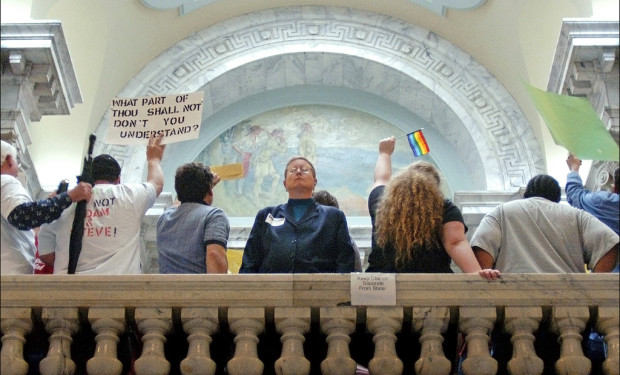Increasing Litigation and Changing Attitudes Lead the Fight Against North Carolina’s Same-Sex Marriage Ban
The Complaint filed by the UCC against North Carolina’s same-sex marriage ban highlights the ongoing litigation and changing viewpoints that seem to be increasing since “Amendment One” was passed two years ago.
Editor’s Note: This article is the second in a three-part series discussing legal challenges to North Carolina’s “Amendment One,” which was passed in May 2012 and banned same-sex marriages in the state. You can read Part One here.
The complaint filed on April 28, 2014 by the United Church of Christ reignited the awareness of North Carolina’s same-sex marriage ban, and the fight to repeal it. May 8, 2014 was the two-year anniversary of the vote that made it illegal for same-sex couples to marry in North Carolina. When the vote occurred two years ago, it felt like a decisive win for its supporters. However, there now seems to be increased support to yet again fight for marriage equality in North Carolina.
It is not far-fetched to say that a lot has changed in the two years since the Amendment One vote was cast. One of the key cases on marriage equality, United States v. Windsor, found sections of the Defense of Marriage Act (DOMA) to be unconstitutional. The decision also effectively recognized same-sex marriages as legal in the states that vote in its favor, and keeps it illegal in states that vote to ban it.
Another case, Bostic v. Schaefer, was heard before the United States Court of Appeals for the Fourth Circuit in Virginia on May 13, 2014. This case, which challenges Virginia’s ban on same-sex marriage, will have immediate implications on North Carolina, as well as four other states that fall within the Fourth Circuit’s jurisdiction. During oral arguments, two of the three appellate judges seemed to already have made up their minds on the issue, leaving a third, independent appellate judge as the “swing vote” in the decision.
Additionally, it appears that views on same-sex marriage are changing at a fairly rapid pace in regards to those who support marriage equality. Increasing litigation, coupled with additional states legalizing same-sex marriage, shows that advocates for marriage equality are at the least holding firm in their fight for the legalization of same-sex marriage. Statistics also reveal that over sixty percent of younger voters in North Carolina favor marriage equality.
Further, the issue of same-sex marriage is highlighted by the North Carolina Senate race between Thom Tillis and current U.S. Senator and Democrat, Kay Hagan. Tillis foreshadowed the ebb and flow of the same-sex marriage debate during his time as Speaker of the North Carolina House of Representatives when Amendment One was being discussed and voted on. Tillis, who supported the Amendment One vote, stated in March 2012 that even if the ban on same-sex marriage were passed, it would probably be repealed in roughly twenty years because of the shifting ideology in younger voters.
Tillis’ statement two years ago seems to be prophetic, although it is possible that even he would not believe there would be such strong opposition so fast after North Carolina’s vote. With current litigation and shifting beliefs, it seems that a North Carolina vote for marriage equality will most likely pass one day. Whether the change will occur in another couple years, or another twenty years, is a question for the legal system and voters to decide.





